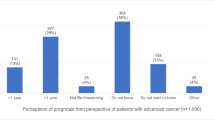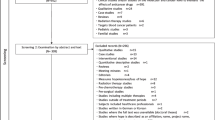Abstract
Goals
There is considerable debate concerning prognosis in patients with advanced cancer (advanced cancer patients, ACP), but no one has systematically examined the relationship between awareness of prognosis and hopefulness. In this study, the relationships among awareness of prognosis, hopefulness, and coping were examined in a selected group of ACP.
Patients and methods
All subjects were enrolled in phase I trials. Information was obtained from subjects via structured, face-to-face interviews. Subjects provided demographic information, answered questions designed to ascertain their awareness of their prognosis, and completed the Functional Assessment of Cancer Therapy—General instrument (FACT-G).
Results
A total of 179 consecutive subjects enrolled in phase I trials were interviewed. Awareness of prognosis was assessed using a semiquantitative scale. Willingness to provide responses to the question was significantly negatively correlated with hopefulness (r=−0.306, P=0.030). Using items from the FACT-G, hopefulness and coping were positively correlated (r=0.140, P=0.097). Female subjects were more realistic about their prognosis than men (b=0.568, P=0.026). More educated patients had higher response rates to the prognosis questions (OR 1.62, P<0.001), and demonstrated a more realistic awareness of prognosis (b=0.225, P=0.030). Overall, there was a strong association between coping status and responding to the prognosis questions (P=0.033). Patients who reported being "not at all proud of coping" had a lower response rate than patients who reported better coping.
Discussion
Among the ACP who provided responses, many reported an unrealistic view of their prognosis. Having a more accurate view of prognosis in the face of terminal illness was associated with reduced hopefulness, which may be related to a poorer sense of coping. Finally, the prognosis question utilized in the study was problematic, led to a fairly poor response rate, and may be indicative of the many difficulties present in attempting to accurately assess ACPs' perceptions of their prognosis. Other methods, such as in-depth qualitative methods, may lead to more productive inquiry into ACPs' awareness of their prognosis. Further research into the accurate assessment of awareness of prognosis is needed.
Similar content being viewed by others
References
Amir M (1987) Considerations guiding physicians when informing cancer patients. Soc Sci Med 24:741–748
Benzein E, Saveman BI (1998) Nurses' perception of hope in patients with cancer: a palliative care perspective. Cancer Nurs 21:10–16
Benzein E, Saveman BI (1998) One step towards the understanding of hope: a concept analysis. Int J Nurs Stud 35:322–329
Benzein E, Norberg A, Saveman BI (1998) Hope: future imagined reality. The meaning of hope as described by a group of healthy Pentecostalists. J Adv Nurs 28:1063–1070
Cassem NH, Stewart RS (1975) Management and care of the dying patient. Int J Psychiatry Med 6:293–304
Cella DF, Tulsky DS, Gray G, Sarafian B, Linn E, Bonomi A, Silberman M, Yellen SB, Winicour P, Brannon J, et al (1993) The functional assessment of cancer therapy scale: development and validation of the general measure. J Clin Oncol 11:570–579
Chochinov HM, Wilson KG, Enns M, Lander S (1998) Depression, hopelessness, and suicidal ideation in the terminally ill. Psychosomatics 39:366–370
Chochinov HM, Tataryn DJ, Wilson KG, Ennis M, Lander S (2000) Prognostic awareness and the terminally ill. Psychosomatics 41:500–504
Christakis NA (1994) Timing of referral of terminally ill patients to an outpatient hospice. J Gen Intern Med 9:314–320
Daugherty CK (2000) Informed consent, the cancer patient, and phase I clinical trials. Cancer Treat Res 102:77–89
Daugherty C, Ratain MJ, Grochowski E, Stocking C, Kodish E, Mick R, Siegler M (1995) Perceptions of cancer patients and their physicians involved in phase I trials. J Clin Oncol 13:1062–1072
Daugherty CK, Ratain MJ, Minami H, Banik DM, Vogelzang NJ, Stadler WM, Siegler M (1998) Study of cohort-specific consent and patient control in phase I cancer trials. J Clin Oncol 16:2305–2312
Daugherty CK, Banik DM, Janisch LJ, Ratain M (2000) Quantitative analysis of ethical issues in phase I trials: a survey interview of 144 advanced cancer patients. IRB: A Review of Human Subjects Research 22:6–14
Farran CJ, Herth KA, Popovich JM (1995) Hope and hopeless: critical clinical constructs. SAGE Publications, Thousand Oaks London New Delhi
Forster LE, Lynn J (1988) Predicting life span for applicants to inpatient hospice. Arch Intern Med 148:2540–2543
Haidet P, Hamel MB, Davis RB, Wenger N, Reding D, Kussin PS, Connors AF Jr, Lynn J, Weeks JC, Phillips RS (1998) Outcomes, preferences for resuscitation, and physician-patient communication among patients with metastatic colorectal cancer. SUPPORT investigators. Study to understand prognoses and preferences for outcomes and risks of treatments. Am J Med 105:222–229
Hardy RE, Green DR, Jordan HW, Hardy G (1980) Communication between cancer patients and physicians. South Med J 73:755–757
Hinton J (1996) How reliable are relatives' retrospective reports of terminal illness? Patients' and relatives' accounts compared. Soc Sci Med 43:1229–1236
Janisch L, Mick R, Schilsky RL, Vogelzang NJ, O'Brien S, Kut M, Ratain MJ (1994) Prognostic factors for survival in patients treated in phase I clinical trials. Cancer 74:1965–1973
Kodish E, Stocking C, Ratain MJ, Kohrman A, Siegler M (1992) Ethical issues in phase I oncology research: a comparison of investigators and institutional review board chairpersons. J Clin Oncol 10:1810–1816
Koenig RR (1969) Anticipating death from cancer—physician and patient attitudes. Mich Med 68:899–905
Kylma J, Isola A (1997) Nursing research on the dynamics of hope in the elderly—a review (in Finnish). Hoitotiede 9:66–75
Kylma J, Vehvilainen-Julkunen K (1997) Hope in nursing research: a meta-analysis of the ontological and epistemological foundations of research on hope. J Adv Nurs 25:364–371
Lamont EB, Christakis NA (1999) Some elements of prognosis in terminal cancer. Oncology 13:1165–1170
Mackillop WJ, Quirt CF (1997) Measuring the accuracy of prognostic judgments in oncology. J Clin Epidemiol 50:21–29
Mackillop WJ, Stewart WE, Ginsburg AD, Stewart SS (1988) Cancer patients' perceptions of their disease and its treatment. Br J Cancer 58:355–358
Maltoni M, Nanni O, Derni S, Innocenti MP, Fabbri L, Riva N, Maltoni R, Amadori D (1994) Clinical prediction of survival is more accurate than the Karnofsky performance status in estimating life span of terminally ill cancer patients. Eur J Cancer 6:764–766
Morse JM, Doberneck B (1995) Delineating the concept of hope. Image J Nurs Sch 27:277–285
Morse JM, Penrod J (1999) Linking concepts of enduring, uncertainty, suffering, and hope. Image J Nurs Sch 31:145–150
Oxenham D, Cornbleet MA (1998) Accuracy of prediction of survival by different professional groups in a hospice. Palliat Med 12:117–118
Parkes CM (1972) Accuracy of predictions of survival in later stages of cancer. BMJ 2:29–31
Rees C, Joslyn S (1998) The importance of hope. Nurs Stand 12:34–35
Reynolds PM, Sanson-Fisher RW, Poole AD, Harker J, Byrne MJ (1981) Cancer and communication: information-giving in an oncology clinic. BMJ 282:1449–1451
Rustoen T, Hanestad BR (1998) Nursing intervention to increase hope in cancer patients. J Clin Nurs 7:19–27
Rustoen T, Wiklund I, Hanestad BR, Moum T (1998) Nursing intervention to increase hope and quality of life in newly diagnosed cancer patients. Cancer Nurs 21:235–245
SUPPORT Principal Investigators (1995) A controlled trial to improve care for seriously ill hospitalized patients. The study to understand prognoses and preferences for outcomes and risks of treatments (SUPPORT). JAMA 274:1591–1598
Weeks JC, Cook EF, O'Day SJ, Peterson LM, Wenger N, Reding D, Harrell FE, Kussin P, Dawson NV, Connors AF Jr, Lynn J, Phillips RS (1998) Relationship between cancer patients' predictions of prognosis and their treatment preferences. JAMA 279:1709–1714
Zhong Z, Lynn J (1999) Some elements of prognosis in terminal cancer: the Lamont/Christakis reviewed. Oncology 13:1172–1173
Author information
Authors and Affiliations
Corresponding author
Additional information
This work was supported by grants from the American Society of Clinical Oncology (C.K.D., Career Development Award) and the NIH (C.K.D., RO1 CA 087605-01A1)
Appendix: questions used to assess awareness of prognosis
Appendix: questions used to assess awareness of prognosis
I am now going to ask you some pretty difficult questions about the possibility of death from your cancer. If you wish, you do not have to answer the questions.
-
1.
I am going to read four statements about the possibility of your death occurring from your cancer. I would like you to tell me which of the four statements best describes your feelings as to the chances of your death occurring from your cancer. [Read the statements and then code on the table below]
-
2.
Now I would like you to tell me which of the four statements best describes your feelings as to the chances of your death occurring from your cancer within the next 5 years. [Read the statements and then code on the table below]
-
3.
Now I would like you to tell me which of the four statements best describes your feelings as to the chances of your death occurring from your cancer within the next year. [Read the statements and then code on the table below]
The statements relating to questions 1–3 are shown in Table 6.
Rights and permissions
About this article
Cite this article
Helft, P.R., Hlubocky, F., Wen, M. et al. Associations among awareness of prognosis, hopefulness, and coping in patients with advanced cancer participating in phase I clinical trials. Support Care Cancer 11, 644–651 (2003). https://doi.org/10.1007/s00520-003-0496-y
Received:
Accepted:
Published:
Issue Date:
DOI: https://doi.org/10.1007/s00520-003-0496-y




